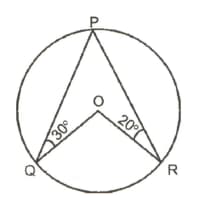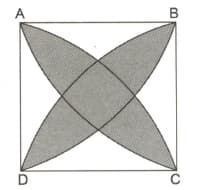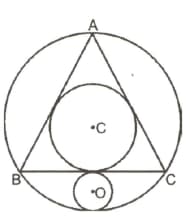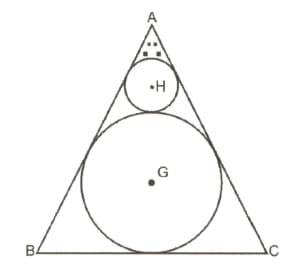Nishit K Sinha Solutions for Chapter: Measurement, Exercise 4: Benchmarking Test 4
Nishit K Sinha Quantitative Aptitude Solutions for Exercise - Nishit K Sinha Solutions for Chapter: Measurement, Exercise 4: Benchmarking Test 4
Attempt the free practice questions on Chapter 4: Measurement, Exercise 4: Benchmarking Test 4 with hints and solutions to strengthen your understanding. Quantitative Aptitude for the CAT solutions are prepared by Experienced Embibe Experts.
Questions from Nishit K Sinha Solutions for Chapter: Measurement, Exercise 4: Benchmarking Test 4 with Hints & Solutions

In the given figure, if and , then is equal to:
In the figure given below, is a square of side length units. Shaded parts are the sectors of the different circles with , , , and as the centres. What is the area (in sq. units) of the shaded region?

In the figure given below, is an equilateral of side length units and circle with centre is the in-circle. Another circle with centre is drawn in such a way that side of the triangle is tangent to the circle and circumcircle is having a point of tangency with this circle. What will be the length of the radius of the circle with centre ?

In the figure given below, is an equilateral triangle with side length units. Triangles are arranged inside this triangle in such a way that the circle with centre is the incircle of the triangle and the circle with centre is formed on the circle with centre and so on. The next circle will be created on this circle with centre and so on, and the infinite circles are created one above the other.

What is the sum of the radius of all such circles formed?
An octagon is inscribed in a circle. One set of alternate vertices forms a square of area units. The other set forms a rectangle area of units. What is the maximum possible area for the octagon (in sq. units)?
What is the largest number of the quadrilaterals formed by four adjacent vertices of an convex polygon of n sides that can have an inscribed circle?
There are two circles with centres at and , respectively. The circle with centre A has a radius of units and the circle with centre has a radius of units and the distance of is units. Both the circles meet at points and . A line through meets the circles again at and (with on the larger circle) in such a way that . Find the length of .
A circle of units is taken. Now, circles of the same radii are inserted in this circle , where is a natural number) in such a way that they are encompassing the maximum possible areas of the circle and are inside the bigger circle along its circumference. (Obviously, for , radius of the inside circle will be same as the radius of the outside circle. Similarly, for , radius of the inside circle will be half of the outside bigger circle and so on.) For how many values of , radius of the circle will be an integer?
